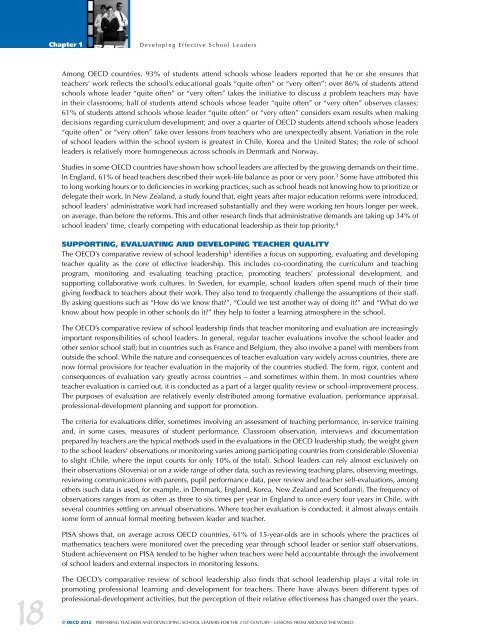Preparing Teachers and Developing School Leaders for the 21st Century
Preparing Teachers and Developing School Leaders for the 21st Century
Preparing Teachers and Developing School Leaders for the 21st Century
You also want an ePaper? Increase the reach of your titles
YUMPU automatically turns print PDFs into web optimized ePapers that Google loves.
18 ©<br />
Chapter 1<br />
developing effective school leaders<br />
among oecd countries, 93% of students attend schools whose leaders reported that he or she ensures that<br />
teachers’ work reflects <strong>the</strong> school’s educational goals “quite often” or “very often”; over 86% of students attend<br />
schools whose leader “quite often” or “very often” takes <strong>the</strong> initiative to discuss a problem teachers may have<br />
in <strong>the</strong>ir classrooms; half of students attend schools whose leader “quite often” or “very often” observes classes;<br />
61% of students attend schools whose leader “quite often” or “very often” considers exam results when making<br />
decisions regarding curriculum development; <strong>and</strong> over a quarter of oecd students attend schools whose leaders<br />
“quite often” or “very often” take over lessons from teachers who are unexpectedly absent. variation in <strong>the</strong> role<br />
of school leaders within <strong>the</strong> school system is greatest in chile, Korea <strong>and</strong> <strong>the</strong> united states; <strong>the</strong> role of school<br />
leaders is relatively more homogeneous across schools in denmark <strong>and</strong> norway.<br />
studies in some oecd countries have shown how school leaders are affected by <strong>the</strong> growing dem<strong>and</strong>s on <strong>the</strong>ir time.<br />
in engl<strong>and</strong>, 61% of head teachers described <strong>the</strong>ir work-life balance as poor or very poor. 3 some have attributed this<br />
to long working hours or to deficiencies in working practices, such as school heads not knowing how to prioritize or<br />
delegate <strong>the</strong>ir work. in new Zeal<strong>and</strong>, a study found that, eight years after major education re<strong>for</strong>ms were introduced,<br />
school leaders’ administrative work had increased substantially <strong>and</strong> <strong>the</strong>y were working ten hours longer per week,<br />
on average, than be<strong>for</strong>e <strong>the</strong> re<strong>for</strong>ms. this <strong>and</strong> o<strong>the</strong>r research finds that administrative dem<strong>and</strong>s are taking up 34% of<br />
school leaders’ time, clearly competing with educational leadership as <strong>the</strong>ir top priority. 4<br />
supporTIng, evAluATIng And developIng TeACher quAlITy<br />
The OECD’s comparative review of school leadership 5 identifies a focus on supporting, evaluating <strong>and</strong> developing<br />
teacher quality as <strong>the</strong> core of effective leadership. this includes co-coordinating <strong>the</strong> curriculum <strong>and</strong> teaching<br />
program, monitoring <strong>and</strong> evaluating teaching practice, promoting teachers’ professional development, <strong>and</strong><br />
supporting collaborative work cultures. in sweden, <strong>for</strong> example, school leaders often spend much of <strong>the</strong>ir time<br />
giving feedback to teachers about <strong>the</strong>ir work. <strong>the</strong>y also tend to frequently challenge <strong>the</strong> assumptions of <strong>the</strong>ir staff.<br />
By asking questions such as “how do we know that?”, “could we test ano<strong>the</strong>r way of doing it?” <strong>and</strong> “What do we<br />
know about how people in o<strong>the</strong>r schools do it?” <strong>the</strong>y help to foster a learning atmosphere in <strong>the</strong> school.<br />
The OECD’s comparative review of school leadership finds that teacher monitoring <strong>and</strong> evaluation are increasingly<br />
important responsibilities of school leaders. in general, regular teacher evaluations involve <strong>the</strong> school leader <strong>and</strong><br />
o<strong>the</strong>r senior school staff; but in countries such as france <strong>and</strong> Belgium, <strong>the</strong>y also involve a panel with members from<br />
outside <strong>the</strong> school. While <strong>the</strong> nature <strong>and</strong> consequences of teacher evaluation vary widely across countries, <strong>the</strong>re are<br />
now <strong>for</strong>mal provisions <strong>for</strong> teacher evaluation in <strong>the</strong> majority of <strong>the</strong> countries studied. <strong>the</strong> <strong>for</strong>m, rigor, content <strong>and</strong><br />
consequences of evaluation vary greatly across countries – <strong>and</strong> sometimes within <strong>the</strong>m. in most countries where<br />
teacher evaluation is carried out, it is conducted as a part of a larger quality review or school-improvement process.<br />
<strong>the</strong> purposes of evaluation are relatively evenly distributed among <strong>for</strong>mative evaluation, per<strong>for</strong>mance appraisal,<br />
professional-development planning <strong>and</strong> support <strong>for</strong> promotion.<br />
<strong>the</strong> criteria <strong>for</strong> evaluations differ, sometimes involving an assessment of teaching per<strong>for</strong>mance, in-service training<br />
<strong>and</strong>, in some cases, measures of student per<strong>for</strong>mance. classroom observation, interviews <strong>and</strong> documentation<br />
prepared by teachers are <strong>the</strong> typical methods used in <strong>the</strong> evaluations in <strong>the</strong> oecd leadership study, <strong>the</strong> weight given<br />
to <strong>the</strong> school leaders’ observations or monitoring varies among participating countries from considerable (Slovenia)<br />
to slight (chile, where <strong>the</strong> input counts <strong>for</strong> only 10% of <strong>the</strong> total). school leaders can rely almost exclusively on<br />
<strong>the</strong>ir observations (slovenia) or on a wide range of o<strong>the</strong>r data, such as reviewing teaching plans, observing meetings,<br />
reviewing communications with parents, pupil per<strong>for</strong>mance data, peer review <strong>and</strong> teacher self-evaluations, among<br />
o<strong>the</strong>rs (such data is used, <strong>for</strong> example, in denmark, engl<strong>and</strong>, Korea, new Zeal<strong>and</strong> <strong>and</strong> scotl<strong>and</strong>). <strong>the</strong> frequency of<br />
observations ranges from as often as three to six times per year in engl<strong>and</strong> to once every four years in chile, with<br />
several countries settling on annual observations. Where teacher evaluation is conducted, it almost always entails<br />
some <strong>for</strong>m of annual <strong>for</strong>mal meeting between leader <strong>and</strong> teacher.<br />
Pisa shows that, on average across oecd countries, 61% of 15-year-olds are in schools where <strong>the</strong> practices of<br />
ma<strong>the</strong>matics teachers were monitored over <strong>the</strong> preceding year through school leader or senior staff observations.<br />
student achievement on Pisa tended to be higher when teachers were held accountable through <strong>the</strong> involvement<br />
of school leaders <strong>and</strong> external inspectors in monitoring lessons.<br />
The OECD’s comparative review of school leadership also finds that school leadership plays a vital role in<br />
promoting professional learning <strong>and</strong> development <strong>for</strong> teachers. <strong>the</strong>re have always been different types of<br />
professional-development activities, but <strong>the</strong> perception of <strong>the</strong>ir relative effectiveness has changed over <strong>the</strong> years.<br />
OECD 2012 PreParing teachers <strong>and</strong> develoPing school leaders <strong>for</strong> <strong>the</strong> <strong>21st</strong> century – lessons froM around <strong>the</strong> World


